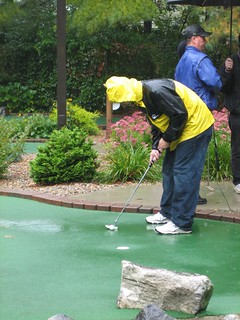The Skills for Winning
by Pat Sheridan on 04/23/15
We're 23 days away
and I still haven't lifted a putter.
Fear not though, it looks like there is a round or two in my near future
with a fellow professional miniature golfer.
I'm also a mere four posts into my blogging life and I already have a correction to make. In my previous post where I talked some about gender equality in miniature golf, I failed to mention the other golfer that KPMG sponsors, Stacy Lewis of the LPGA (only one of the best female golfers). Maybe someday KPMG will put something together where I can play both Stacy ad Phil on the mini-links.
While your focus doesn't always need to be on winning a tournament, the skills for winning are also the ones you'll need to have a good tournament experience and a decent showing in your scores. It's always easier to have fun at a tournament when you feel like you're playing your best. There are four things you need to be a good miniature golfer: putting skill, course knowledge, physical fitness and mental fitness.
Putting Skill: There is no doubt about it - you need to have some sort of skill with the putter to do well in a tournament. The other three factors are about preparation. This one is about execution. If you can't put together the aim, swing, contact and follow through, you are going to have a long day. The good thing, I think, is that putting is easier to improve than driving a golf ball or enhancing your wedge shots. The movements are more controlled, the speed of the club is less and it is something you can work on in your living room. But don't think all you need is some time on the practice green or playing a lot of regular golf. Putting in minigolf is slightly different than "big" golf as the putting surface is quite different and you have added factors such as obstacles and brick bounce. More good news - spending more time on the minigolf course to refine your skills is pretty easy since you can bring your family along too!
Course Knowledge: I'll talk more about preparing for a course in a future post but as G.I. Joe said "knowing is half the battle". Just like you need to know where to hit your drive in golf so it doesn't go in the water or whether a green is protected by bunkers, you have to know what a minigolf course is hiding. It's not just knowing about the breaks of the putts either. You need to know which brick is going to give you the right bounce or which one has defect that might send your ball flying. You need to know how the course changes in the rain, since we'll play in it. You need to know where to tee your ball to get the best angle at the hole. Lisa Simpson was dead on when she was figuring out all the angles for Bart; you'll have to do the same (yes - you should have paid attention in geometry class).

Josh Tiberio playing in the rain in the 2006 Odetah Fall Classic
Physical Fitness: Laugh all you want but a USPMGA miniature
golf tournament is going to kick your butt. Let's assume you play a ten round
tournament and take ten rounds of practice.
At a minimum you're taking 720 putts (assuming 2 per hole) over three to
four days. That’s 720 times you have to
bend your knees and swing your arms.
It's 360 times you'll have to bend over the place the ball and 360 times
you'll have to retrieve the ball from the hole.
It's 20-30 hours of being on your feet in the sun, wind, rain, heat and/or
cold. It's not so much a test of your endurance or strength as it is a test of
your joints. Now, I don't want to oversell it and make it seem like you're running
a marathon but don't be
surprised if your knees and back twinge by the end of a tournament. In the end though, I'm an accountant with the
physical fitness of a beluga whale so there's a good chance that your body can
withstand the punishment.
Mental Fitness: A tournament will test your ability to keep focused and not to lose your cool. There's nothing worse than missing an easy deuce putt, turning that into a four on that hole and then immediately following it up with another three or four on the next holes. You're going to take 360 putts in a USPMGA tournament; chances are at least one of them is going to suck. It's how you deal with those disappointing putts that will determine how well you do in the tournament. It is one thing to tell yourself, or a friend, to "shake it off," it's another thing to do it in practice when every putt counts. You may not think a minigolf tournament can be stressful but when it comes down to sinking putts to seal your ranking, it's easy to fall into the intensity of the moment.
Master those four areas and you'll be a respectable professional miniature golfer!

